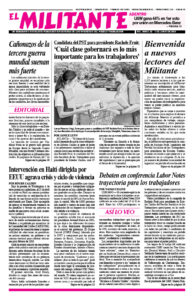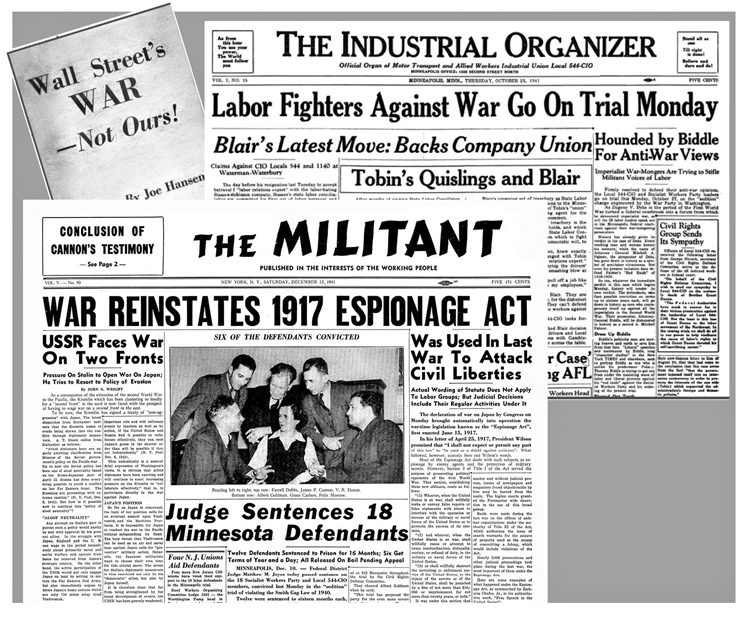Socialism on Trial, one of Pathfinder’s Books of the Month for May, contains the testimony of James P. Cannon, a founding leader of the Socialist Workers Party and then its national secretary, at the 1941 trial of 18 leaders of the SWP and the Minneapolis Teamsters union. Under the thought-control Smith Act, they were found guilty and jailed on charges of conspiring to advocate the overthrow of the U.S. government. The U.S. rulers’ aim was to prevent the building of working-class opposition to their entry into World War II and to block development of class-struggle leadership in the labor movement. In the excerpt below, Cannon explains the SWP’s political views and activities in the labor movement. Copyright © 2014 by Pathfinder Press. Reprinted by permission.
Q: Mr. Cannon, will you tell us the position of the Socialist Workers Party on the causes of modern war?
A: Modern wars, in the opinion of our party, are caused by the conflict of imperialist nations for markets, colonies, sources of raw material, fields for investment, and spheres of influence.
Q: What do you mean by “imperialist,” Mr. Cannon?
A: Those capitalist nations which directly or indirectly exploit other countries.
Q: What is the party’s position on the inevitability of wars under the capitalist system?
A: As long as the capitalist system remains, and with it those conditions which I have mentioned, which flow automatically from the operation of the capitalist and imperialist system, wars, recurring wars, are inevitable.
Q: And can anybody’s opposition, including the opposition of the Socialist Workers Party to war, prevent wars under the capitalist system?
A: No. Our party has always stated that it is impossible to prevent wars without abolishing the capitalist system which breeds war. It may be possible to delay a war for a while, but eventually it is impossible to prevent wars while this system, and its conflicts of imperialist nations, remains.
Q: Then is it true that the party is of the opinion that wars are caused by international economic conflicts, and not by the good will or bad will of some people?
A: Yes. That does not eliminate the possibility of incidental attacks being caused by the acts of this or that ruling group of one country or another; but fundamentally wars are caused by the efforts of all the capitalist powers to expand into other fields. The only way they can get them is by taking them away from some other power, because the whole world has been divided up among a small group of imperialist powers. That is what leads to war, regardless of the will of the people.
We do not maintain that the ruling groups of any of the imperialist powers now at war really desired the war. We have stated many times that they would have been glad to have avoided it; but they could not avoid it and maintain the capitalist system in their country.
Q: What is the attitude of the party towards a war which it designates as an imperialist war?
A: Our party is unalterably opposed to all imperialist wars. … [W]e do not give any support to any imperialist war. We do not vote for it; we do not vote for any person that promotes it; we do not speak for it; we do not write for it. We are in opposition to it.
Q: How does the Socialist Workers Party oppose the idea of the United States entering into the war?
A: We do it as every other political party promotes its ideas on any foreign policy. We write against it in the paper; we speak against it; we try to create sentiment in any organization we can approach, to adopt resolutions against the war.
If we had members in Congress, they would speak in Congress, in the Senate, against it. In general we carry on public political agitation against the entry of the United States into war, and against all measures taken either by the Executive or by Congress which in our opinion lead towards active participation in the war. …
Q: If the United States should enter into the European conflict, what form would the opposition of the party take to the war? …
A: [W]e would not become supporters of the war, even after the war was declared. That is, we would remain an opposition political party on the war question, as on others.
Q: You would not support the war?
A: That is what I mean, we would not support the war, in a political sense. …
Q: When you say, “nonsupport of the war,” just exactly what would the party do during a war, which would indicate its nonsupport of the war?
A: Insofar as we are permitted our rights, we would speak against the war as a false policy that should be changed, in the same sense, from our point of view, that other parties might oppose the foreign policy of the government in time of war. …
In general, we do not put any confidence in the ruling capitalist group in this country. We do not give them any support because we do not think they can or will solve the fundamental social problems which must be solved in order to save civilization from shipwreck.
We believe that the necessary social transition from the present system of capitalism to the far more efficient order of socialism can only be brought about under a leadership of the workers. The workers must organize themselves independently of the capitalist political parties. They must organize a great party of their own, develop an independent working-class party of their own, and oppose the policy of the capitalist parties, regardless of whether they are called the Democratic or Republican, or anything else. …
Q: What is the party’s position on the claim that the war against Hitler is a war of democracy against fascism?
A: We say that is a subterfuge, that the conflict between American imperialism and German imperialism is for the domination of the world. It is absolutely true that Hitler wants to dominate the world, but we think it is equally true that the ruling group of American capitalists has the same idea, and we are not in favor of either of them.


